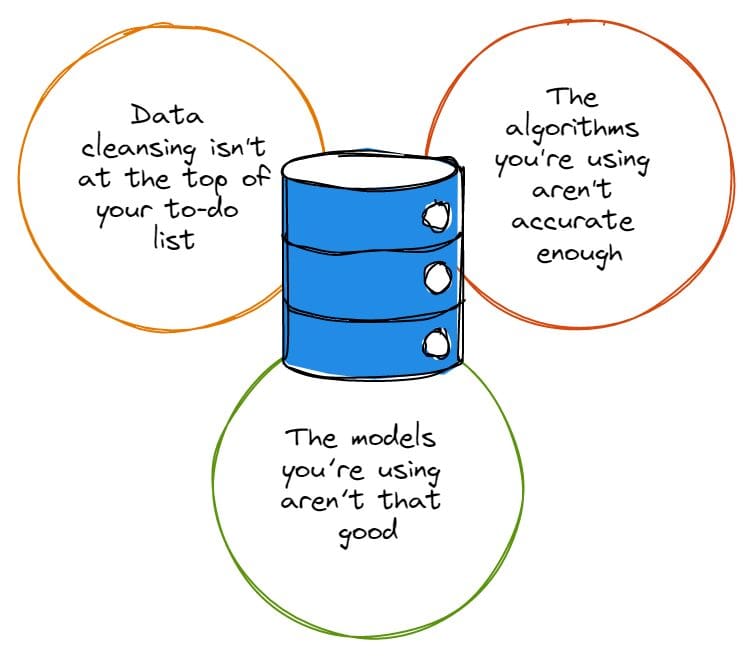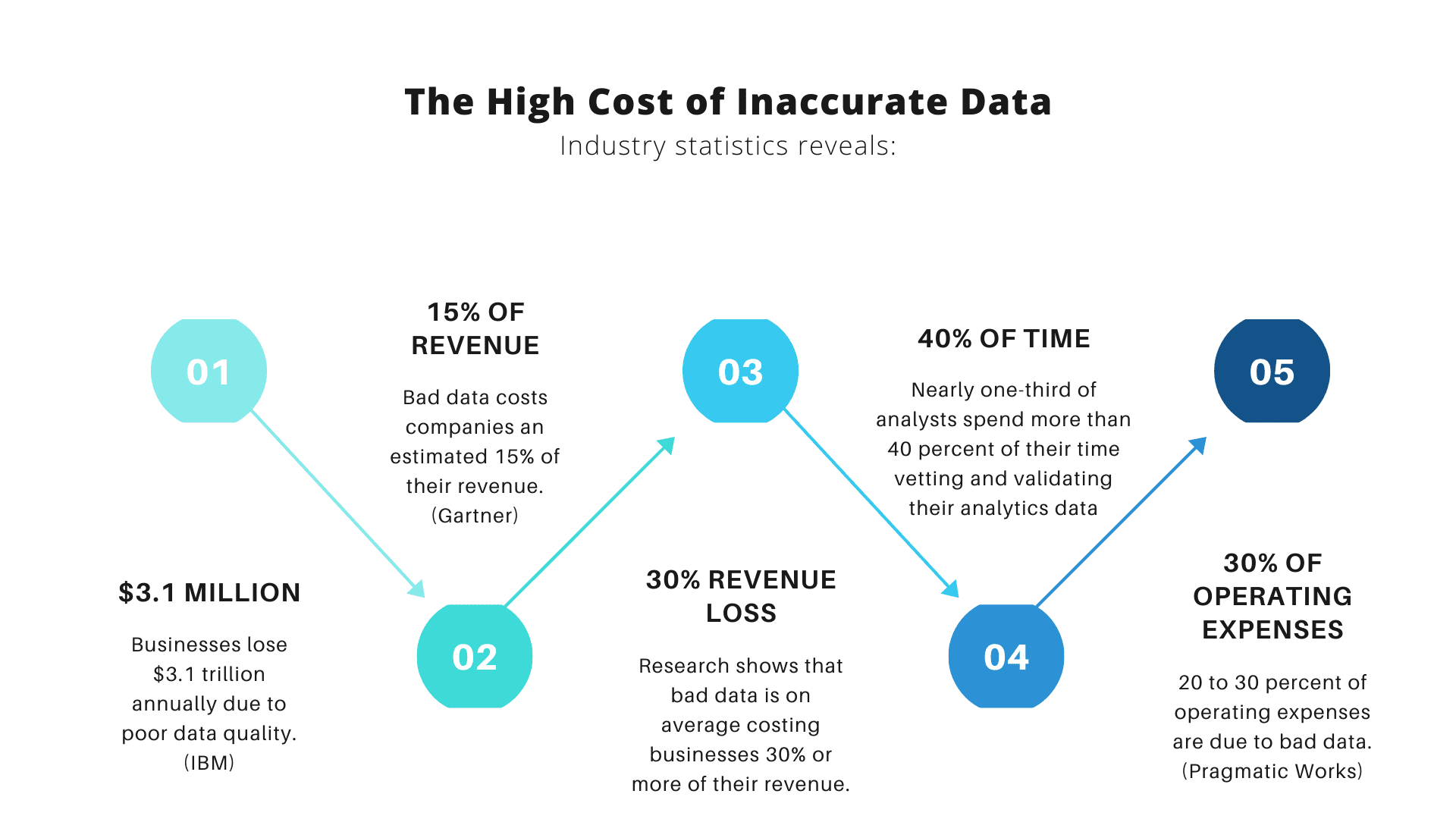[ad_1]

Picture by Editor
It is 2023, which signifies that most companies in most industries are accumulating insights and driving smarter choices with the assistance of huge knowledge. This does not come as a lot of a shock today — the power to assemble, categorize, and analyze huge units of knowledge is immensely helpful on the subject of making data-driven business decisions.
And, as a rising variety of organizations embrace digitization, the power to understand and depend on knowledge analytics’ usefulness will solely proceed to develop.
Here is the factor about huge knowledge, although: as extra organizations come to depend on it, the larger the prospect turns into that extra of them will use huge knowledge incorrectly. Why? As a result of huge knowledge and the insights it affords are solely helpful if organizations are precisely analyzing their knowledge.

Picture from dataladder
To that finish, let’s just remember to’re avoiding some frequent errors that usually have an effect on the accuracy of knowledge analytics. Learn on to find out about these points and how one can keep away from them.
Earlier than we go pointing fingers, we have to admit that almost all units of knowledge have their fair proportion of errors, and these errors do not do anybody any favors when it comes time to investigate knowledge. Whether or not they’re typos, bizarre naming conventions, or redundancies, errors in knowledge units muddle the accuracy of knowledge evaluation.
So earlier than you get too enthusiastic about diving deep into the data analytics rabbit hole, you first have to make it possible for knowledge cleaning is on the prime of your to-do listing and that you just’re at all times correctly cleaning your knowledge units. It’s possible you’ll be saying, “hey, knowledge cleaning is simply too time-consuming for me to hassle with”, to which we nod our heads in sympathy.
Fortunately for you, you possibly can put money into options resembling augmented analytics. This leverages machine studying algorithms to speed up the speed at which you carry out your knowledge evaluation (and it improves the accuracy of your evaluation, too).
The underside line: it doesn’t matter what resolution you employ to automate and enhance your knowledge cleaning, you continue to have to do the precise cleaning — in the event you do not, you may by no means have the right basis on which to base correct knowledge evaluation.
As is the case with knowledge units, most algorithms aren’t 100% good; most of them have their fair proportion of flaws and easily do not work the best way you need them to each time you employ them. Algorithms with a bunch of imperfections may even ignore knowledge which can be important to your evaluation, or they might concentrate on the flawed sort of knowledge that is not truly that vital.
It is no secret that the largest names in tech are constantly scrutinizing their algorithms and tweaking them as near perfection as attainable, and it is as a result of so few algorithms are literally flawless. The extra correct your algorithm is, the higher the assure that your packages are carrying out their targets and doing what you want them to be doing.
Moreover, in case your group staffs even simply a few knowledge scientists, it ought to make it possible for these knowledge scientists are repeatedly making updates to the algorithms that their knowledge evaluation packages — it might even be worthwhile to ascertain a schedule that holds groups accountable for sustaining and updating their knowledge evaluation algorithms following an agreed-upon schedule.
Even higher than which may be establishing a method that leverages AI/ML-based algorithms, which ought to be capable to routinely replace themselves.
Principally understandably, plenty of enterprise leaders who aren’t instantly engaged with their knowledge analytics groups do not realize that algorithms and fashions aren’t the same things. In case YOU weren’t conscious, both, keep in mind that algorithms are the strategies we use to investigate knowledge; fashions are the computations that get created by leveraging an algorithm’s output.
Algorithms can crunch knowledge all day lengthy, but when their output is not going by fashions which can be designed to verify the following evaluation, you then’re not going to have any usable or helpful insights.
Consider it like this: in the event you’ve received fancy algorithms crunching knowledge however haven’t any insights to indicate for it, you are not going to make data-driven choices any higher than you have been earlier than you had these algorithms; it would be like wanting to construct person analysis into your product roadmap however ignoring the truth that, for instance, the market analysis trade generated $76.4 billion in income in 2021, representing a 100% improve since 2008.
Your intentions could also be admirable, however you might want to make use of the fashionable instruments and information accessible to you to glean these insights or construct that person analysis into your roadmap to one of the best of your skills.
It is unlucky that suboptimal fashions are a surefire method to make a multitude of your algorithms’ output, irrespective of how refined these algorithms are. It is due to this fact important that enterprise executives and technical leaders extra intently interact their knowledge evaluation specialists with a purpose to create fashions which can be neither too sophisticated nor too easy.
And, relying on how a lot knowledge they’re working with, enterprise leaders might select to undergo a number of completely different fashions earlier than they choose one which most accurately fits the quantity and kind of knowledge they should deal with.
On the finish of the day, if you wish to be certain that your knowledge evaluation is not persistently flawed, you might want to additionally keep in mind to never fall victim to bias. Bias is sadly one of many biggest hurdles that have to be overcome on the subject of sustaining the accuracy of knowledge analytics.
Whether or not they’re influencing the kind of knowledge that is being collected or impacting the best way enterprise leaders interpret knowledge, biases are diverse and sometimes troublesome to pin down — executives have to do their finest to establish their biases and forgo them with a purpose to profit from persistently correct knowledge analytics.
Knowledge is highly effective: when wielded correctly, it will possibly grant enterprise leaders and their organizations immensely helpful insights that may rework how they develop and ship their merchandise to their clients. Simply just remember to’re doing all the things in your energy to make sure your knowledge analytics are correct and never affected by the simply avoidable errors we have outlined on this article.
Nahla Davies is a software program developer and tech author. Earlier than devoting her work full time to technical writing, she managed — amongst different intriguing issues — to function a lead programmer at an Inc. 5,000 experiential branding group whose purchasers embody Samsung, Time Warner, Netflix, and Sony.
[ad_2]
Source link



